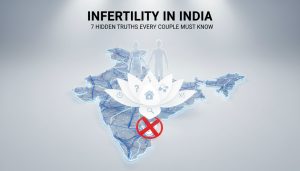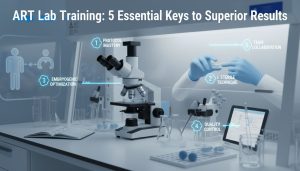Key Highlights
- Understanding your menstrual cycle and tracking ovulation is key to increasing your chances of conception
- Optimizing your health through nutrition and can improve fertility
- Herbal remedies and lifestyle adjustments can also enhance fertility
- Medical interventions may be necessary in some cases
- It’s important to consult with a healthcare professional for personalized guidance
- Donor sperm and assisted reproductive technologies can be options for single or couples facing fertility challenges
Introduction
Embarking on the journey of conception can be both thrilling and challenging. From understanding the intricate mechanisms of fertility to exploring various strategies and interventions, the path to parenthood is unique for every individual or couple.
This guide delves into the realm of fertility, shedding light on crucial aspects such as optimizing health, natural approaches, and the psychological impact of trying to conceive.
By arming yourself with knowledge and proactive measures, including home insemination, you can enhance your chances of successful conception.
Understanding Fertility: The Basics
Fertility is the ability to conceive and carry a pregnancy to term. Understanding fertility is crucial for those trying to conceive. It involves knowing about ovulation, sperm health, and the menstrual cycle.
Misconceptions about conception can hinder your chances. Educating yourself on these fundamental aspects can help you make informed decisions when planning for a family.
What is Fertility and Why is it Important?
Fertility refers to the ability to conceive and carry a pregnancy. Understanding fertility is crucial for family planning and reproductive health. It plays a vital role in shaping individuals’ parenthood journeys.
Common Misconceptions About Conception
While many believe fertility issues solely rest with women, it’s important to note that infertility is just as likely to stem from male factors. Another misconception is that infertility only impacts older individuals when, in reality, age affects both partners.
Additionally, assuming one’s reproductive health is optimal because they already have a child can be misleading; secondary infertility is a real concern for many couples. Dispelling these myths can lead to a better understanding of the intricacies of conception.
Optimizing Your Health for Conception
Prioritizing nutrition rich in fertility-boosting supplements and maintaining a healthy weight positively impacts chances of conception. Regular exercise supports reproductive health by reducing stress and enhancing overall well-being.
Healthy living habits, like avoiding toxins and alcohol, contribute to optimizing fertility potential.
Nutrition and Supplements for Boosting Fertility
Consuming a well-balanced diet rich in fertility-boosting nutrients like zinc, folic acid, and omega-3 fatty acids can enhance your chances of conception.
Supplements such as prenatal vitamins containing iron and vitamin D are beneficial for reproductive health. Additionally, incorporating antioxidants like vitamin C and E can help in improving fertility by combating free radicals.
Consultation with a healthcare provider to determine the right supplements based on individual needs is advisable.
The Role of Exercise in Enhancing Fertility
Regular physical activity can positively influence fertility by regulating hormones and reducing stress. Exercise helps maintain a healthy weight, which is crucial for reproductive health.
It can also improve circulation, leading to better reproductive organ function. Engaging in moderate exercise, such as brisk walking or yoga, can enhance fertility by promoting overall well-being and hormonal balance.
However, excessive or intense workouts may have the opposite effect, so it’s essential to find a healthy balance in your fitness routine to boost your chances of conception.
Sexual Health and Its Impact on Conception
Understanding your menstrual cycle and ovulation is crucial in maximizing your chances of conception. By tracking these cycles, you can identify your most fertile days. For men, improving sperm quality and quantity through a healthy lifestyle can significantly impact conception.
Being aware of these factors and making necessary adjustments can enhance your overall sexual health and increase the likelihood of successful conception, especially after 6 months of marriage.
Understanding Your Menstrual Cycle and Ovulation
To understand your menstrual cycle and ovulation, track the length of your cycle. Ovulation usually occurs around the mid-point of your cycle. Ovulation kits can help pinpoint the fertile window, as they detect luteinizing hormone (LH) in your urine, which surges right before ovulation. Cervical mucus changes, and basal body temperature rises during ovulation.
Regular cycles indicate good reproductive health. Pay attention to these signs for insights into your fertility window. This knowledge can be crucial when trying to conceive.
Improving Sperm Quality and Quantity
Ensuring optimal sperm quality and quantity is vital for enhancing fertility. Factors such as maintaining a healthy weight, avoiding excessive alcohol consumption, and quitting smoking can positively impact sperm health and reproduction.
Additionally, incorporating antioxidant-rich foods into your diet and managing stress levels can further boost sperm quality. Regular exercise and staying hydrated also play key roles in improving sperm parameters. Prioritizing these lifestyle adjustments can significantly improve your chances of conception.
Natural Ways to Increase Your Fertility
Herbal remedies like maca root and evening primrose oil have been linked to improved fertility. Making lifestyle adjustments such as maintaining a healthy weight and reducing alcohol intake can positively impact conception chances.
These natural approaches offer a holistic path to enhancing fertility without medical interventions.
Herbal Remedies and Their Effects on Fertility
When exploring herbal remedies for fertility, it’s crucial to understand their potential effects. Some herbs like chasteberry can help regulate menstrual cycles, while Maca root may boost libido.
However, caution is advised as not all herbal remedies are safe for fertility, such as saw palmetto, which could interfere with hormone levels. Always consult a healthcare provider before trying any herbal remedies to enhance your chances of conception.
Lifestyle Adjustments for Better Fertility
Making lifestyle changes can significantly boost your chances of conception. Ensure a balanced diet rich in fertility-boosting nutrients. Use a fertility-friendly lubricant during sex to increase your chances of conception.
Practice safe sex by using a condom each time, to prevent sexually transmitted infections (STIs) that can harm fertility. Maintain a healthy weight and stay physically active to enhance overall well-being.
Steer clear of smoking, excessive alcohol consumption, and recreational drugs as they can harm fertility. Manage stress levels through relaxation techniques such as yoga or meditation.
Prioritize quality sleep to support reproductive health and hormone balance. Small modifications in daily habits can make a big difference in your fertility journey.
Medical Interventions and When to Consider Them
When exploring medical interventions for fertility, it is crucial to consult a specialist. Fertility testing provides insights into potential issues. ART offers options like IUI and IVF. Consider these interventions after trying natural methods. Consult a doctor for personalized advice.
Fertility Testing – What You Need to Know
Fertility testing can provide valuable information about your reproductive health and help guide your fertility journey. There are several types of fertility tests that may be recommended by your healthcare provider. These tests can assess various aspects of your reproductive system, including hormone levels, egg quality, and the health of your fallopian tubes and uterus.
Some common fertility tests include:
- Ovulation testing: This involves tracking your menstrual cycle and monitoring changes in your body temperature and cervical mucus to determine when you are most fertile.
- Hormone testing: Blood tests can measure hormone levels such as follicle-stimulating hormone (FSH), luteinizing hormone (LH), andadiol to assess ovarian function.
- Semen analysis: This test evaluates the quantity and quality of sperm in a semen sample.
- Hysterosalpingogram (HSG): This is an X-ray procedure that checks for blockages or abnormalities in the fallopian tubes or uterus.
- Ovarian reserve testing: This test assesses the quantity and quality of your eggs, typically through blood tests and ultrasound imaging.
It’s important to note that fertility testing is not a guarantee of fertility or the ability to conceive. However, it can provide valuable information that can guide you and your healthcare provider in developing an appropriate treatment plan.
Type of Fertility Test | Purpose |
Ovulation testing | Track menstrual cycle and determine fertile window |
Hormone testing | Assess ovarian function and hormone levels |
Semen analysis | Evaluate sperm quantity and quality |
Hysterosalpingogram | Check for blockages or abnormalities in fallopian tubes or uterus |
Ovarian reserve testing | Assess quantity and quality of eggs |
Assisted Reproductive Technologies (ART)
Assisted reproductive technologies (ART) are advanced medical procedures that can help individuals and couples overcome fertility challenges.
These procedures involve the manipulation of eggs, sperm, or embryos to achieve pregnancy. Some common ART procedures include in vitro fertilization (IVF), intracytoplasmic sperm injection (ICSI), anduterine insemination (IUI).
IVF is a widely used ART procedure that involves retrieving eggs from the ovaries, fertilizing them with sperm in a laboratory, and then transferring the resulting embryos into the uterus.
In addition to IVF, there are other types of assisted reproductive technologies (ART) available, such as intrauterine insemination (IUI) and intra-cervical insemination (IVI). IUI is performed in a clinical setting and involves placing sperm directly into the uterine cavity using a sterile syringe, increasing the chances of fertilization.
IVI, on the other hand, involves injecting sperm into the vagina using a sterile syringe, allowing the sperm cells to travel naturally into the uterus and hopefully progress further on to fertilize the egg.
ART procedures like IUI, IVF, and IVI can be effective options for couples facing various fertility issues, such as blocked fallopian tubes, low sperm count or motility, or unexplained infertility. The use of a sterile syringe in these procedures ensures the safety and effectiveness of the ART process.
ICSI is a specialized form of IVF in which a single sperm is injected directly into an egg. This procedure is often recommended for couples with severe male factor infertility.
IUI involves placing washed and concentrated sperm directly into the uterus during the woman’s fertile window. This procedure can be used for couples with mild male factor infertility or unexplained infertility.
It’s important to note that ART procedures may not be suitable for everyone and should be discussed with a fertility specialist. These procedures can be invasive and expensive, and success rates vary depending on individual circumstances.
Psychological Aspects of Trying to Conceive
Trying to conceive can be an emotionally and mentally challenging journey. The pressure to get pregnant quickly can lead to increased stress levels and negative emotions. Managing stress and prioritizing emotional well-being is important for optimizing fertility and overall health.
Stress can have a direct impact on the reproductive system by affecting hormone levels and menstrual regularity. Chronic stress can disrupt the delicate balance of hormones necessary for ovulation and conception. Additionally, stress can negatively impact sexual desire and intimacy, which are important aspects of trying to conceive.
Taking steps to reduce stress and prioritize self-care can have a positive impact on fertility. This may include practicing relaxation techniques such as deep breathing, meditation, or yoga. Engaging in activities that bring joy and relaxation, such as spending time outdoors, connecting with loved ones, or pursuing hobbies, can also help reduce stress levels.
Seeking support from a therapist or counselor who specializes in fertility can provide additional emotional support and guidance throughout the journey.
Managing Stress and Emotional Well-being
Managing stress and prioritizing emotional well-being is important for optimizing fertility and overall health. The journey to conceive can be emotionally and mentally challenging, and the pressure to get pregnant quickly can increase stress levels and negative emotions.
Here are some strategies for managing stress and promoting emotional well-being:
- Practice relaxation techniques: Deep breathing, meditation, and yoga can help reduce stress levels and promote relaxation.
- Engage in regular physical activity: Exercise releases endorphins, which are natural mood boosters. Find activities that you enjoy and make them a regular part of your routine.
- Prioritize self-care: Set aside time for activities that bring you joy and help you relax. This could include activities such as reading, taking baths, or practicing hobbies.
- Seek support: Reach out to friends, family, or a support group who can provide emotional support and understanding. Consider working with a therapist or counselor who specializes in fertility to help navigate the emotional challenges.
- Practice positive self-talk: Challenge negative thoughts and replace them with positive affirmations. Focus on self-compassion and remind yourself that you are doing the best you can.
Remember that managing stress and emotional well-being is a journey, and it’s important to be patient and kind to yourself throughout the process.
The Impact of Mental Health on Fertility
Mental health can have a significant impact on fertility. Stress, anxiety, and depression can affect hormone levels, menstrual regularity, and sexual desire, all of which can impact fertility. Mental health disorders, such as polycystic ovary syndrome (PCOS) and endometriosis, can also contribute to fertility challenges.
Stress, in particular, can disrupt the delicate balance of hormones necessary for ovulation and conception. Chronic stress can affect the hypothalamus, the part of the brain that regulates hormone production, leading to irregular menstrual cycles and anovulation (lack of ovulation).
Additionally, mental health challenges may affect a person’s ability to engage in healthy self-care behaviors, such as maintaining a balanced diet, exercising regularly, and getting enough sleep.
Seeking support from a mental health professional can be beneficial for individuals experiencing mental health challenges while trying to conceive. Therapists and counselors can provide guidance, coping strategies, and support to help manage stress and improve mental well-being.
The Importance of Timing
Timing is a crucial factor when trying to conceive. Age, stress levels, and lifestyle choices can all impact fertility and the chances of conception.
Age plays a significant role in fertility. As women age, the quality and quantity of their eggs decline, making it more difficult to conceive. By the age of 35, fertility starts to decrease more rapidly, and by the age of 40, the chances of conceiving naturally decrease significantly.
Stress and lifestyle choices can also affect fertility. High levels of stress can disrupt hormones and interfere with ovulation. Unhealthy lifestyle choices, such as smoking, excessive alcohol consumption, and poor diet, can also negatively impact fertility.
Understanding the importance of timing and making lifestyle changes to optimize fertility can increase the chances of conceiving naturally.
The impact of age on fertility and conception
Age is a significant factor that can impact fertility and the chances of conception. As women age, the quantity and quality of their eggs decline, making it more difficult to conceive.
The most fertile years for women are typically in their 20s and early 30s. By the age of 35, fertility starts to decline more rapidly, and by the age of 40, the chances of conceiving naturally decrease significantly. This decline is due to a decrease in the number of eggs and a decrease in the quality of the remaining eggs.
Advanced maternal age is also associated with an increased risk of pregnancy complications and chromosomal abnormalities in the baby, such as Down syndrome. The risk of miscarriage also increases with age.
It’s important for women to be aware of their fertility window and consider starting a family earlier if they desire to have children. If you’re experiencing difficulty conceiving and are over the age of 35, it’s recommended to seek medical advice sooner rather than later.
How stress and lifestyle choices can affect fertility
Stress and lifestyle choices can have a significant impact on fertility. High levels of stress can disrupt hormones and interfere with ovulation, making it more difficult to conceive. Chronic stress can also affect a person’s overall health and well-being, potentially contributing to fertility challenges.
Unhealthy lifestyle choices, such as smoking, excessive alcohol consumption, and poor diet, can also negatively impact fertility. Smoking has been linked to decreased fertility in both men and women, and excessive alcohol consumption can disrupt hormone levels and impair sperm production.
Maintaining a healthy lifestyle, managing stress, and avoiding harmful substances can improve fertility and increase the chances of conception. Engaging in regular exercise, eating a balanced diet, getting enough sleep, and practicing stress-reduction techniques such as yoga or meditation can support reproductive health.
Conclusion
In conclusion, optimizing your health and lifestyle is crucial for enhancing fertility and increasing your conception potential. Understanding the basics of fertility, debunking misconceptions, and making informed choices about nutrition, exercise, and sexual health are key components.
Herbal remedies, lifestyle adjustments, and considering medical interventions when necessary play significant roles in your fertility journey.
Remember, managing stress and emotional well-being is equally important. Educating yourself on the psychological aspects of trying to conceive and the impact of timing, age, and lifestyle choices can make a significant difference. For more detailed information on natural ways to increase fertility, redirect to our comprehensive blog on this topic.
Frequently Asked Questions
How Long Should We Try Before Seeking Help?
It is generally recommended to seek medical help if you have been actively trying to conceive for one year without success. However, if you are over the age of 35, it is recommended to seek medical help after six months of trying. Fertility specialists can help identify any underlying issues and develop a treatment plan to improve your chances of conception.
Can Lifestyle Changes Really Improve Our Chances?
Making positive lifestyle changes can improve your chances of conception. Maintaining a healthy diet, engaging in regular exercise, managing stress, and avoiding harmful substances such as smoking and excessive alcohol consumption can all support reproductive health and increase the likelihood of conceiving.
What Are the First Steps to Take When You Decide to Start Trying?
When you decide to start trying to conceive, it’s important to track your menstrual cycle and identify your fertile window. This can be done using an ovulation kit or by monitoring changes in your cervical mucus and basal body temperature. Having regular intercourse during your fertile window can increase your chances of conception.





